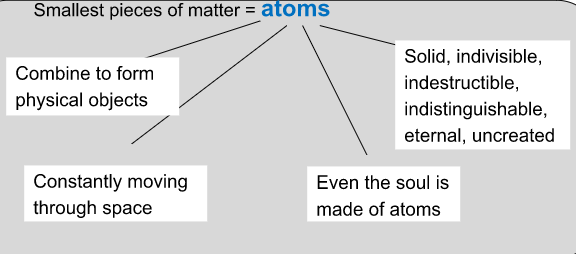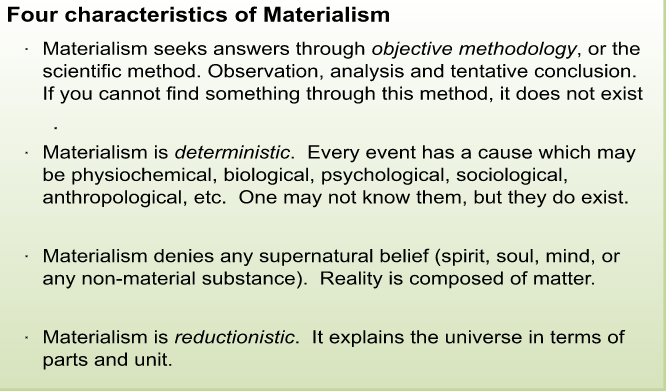3.2 The Nature of Reality: Material or Non-Material?
What St. Augustine had to say:
- reality consists of every kind of spirit and being
- all creatures have some degree of goodness because God filled reality with goodness
- humans are in the middle of hierarchy of reality, bodies & spirits
- humans are a part of two realms of reality
Materialism
Eastern Materialism: Charvaka philosophers of India (~600 BCE)
- Aka the Lokyata (those who go the worldly way)
- Believed we should seek out happiness in this material world and its physical pleasures.
- Felt people should turn away from religion and delusions of religion. Religious worship and priests are pointless as God, souls rewards of heaven/hell do not exist.
- Only one valid source of knowledge of the world: sense perception. What we perceive with our senses is physical and material. If we cannot know something, it cannot exist.
Western Materialism: Democritus (460- 360 BCE)
- believed reality could be explained in terms of matter

- Therefore, the universe consists of atoms and empty space
- This includes the soul and reason
Democritus’ ideas were eventually put aside in favor of more personal, and non-material, explanations of the universe.
Plato, Socrates and Aristotle saw moral virtue as the road to good and happiness.
Their influence carried the momentum of philosophical thought through the Middle Ages.
Rise in Christianity saw an interest in moral conduct, especially with the belief of an afterlife.
In the 17th century, scientific methods turned attention back to materialism.
Copernicus, Kepler, Galileo, Newton showed the world can be quantified.
Thomas Hobbes (1588 – 1679)
- We can know nothing of the world but measurable quantities.
- Only matter is real.
- Our mental states (sensations, thoughts, and emotions) are part of the material brain.
Julien Of-froy de la Mettrie
- In 1778 postulated humans are nothing more than complex machines in his book Man a Machine.
Pierre Laplace
Opposed Newton’s idea of a mechanical universe regulated by God
Universe is self-regulating
“Divine Calculator” (a type of “super-computer” that could calculate all that had happened and all that would happen)
God does not matter

Objections
Difficult to account for thinking, wishing, hoping, dreaming, loving, hating, etc. These belong to the immaterial self, or human consciousness.
Consciousness: awareness of things we do when both awake and sleeping. For example, when one experiences pain, they are aware they are experiencing pain. Awareness is consciousness.
One can feel and see things that don’t exist (i.e. hallucinations)
Consciousness is subjective – “first person”. It is something that one is directly aware of from the inside, that others cannot be aware of from the outside. It has no volume, mass, location therefore philosophers conclude this indicates there must be an immaterial entity.
Therefore, if the material view is correct, it needs to reduce the consciousness to the material, but one cannot measure the conscious experiences.
Matter has now been broken down. Atoms have subatomic particles (proton, electron, and neutron) which have been broken down further into quarks, or bundles of energy.
\n
Werner Heisenberg - “Principle of Indeterminacy” or Heisenberg Principle
- Heisenberg believed subatomic particles didn’t have a determinate location and momentum until they interacted with an observer.
- Areas of probabilities over which there is a greater probability that the subatomic particle, when observed, will pop into existence.
- Therefore, it begs the question, is reality dependent on the mind?